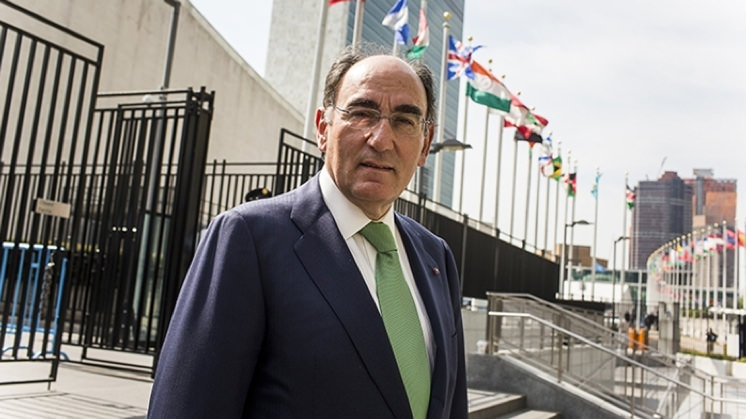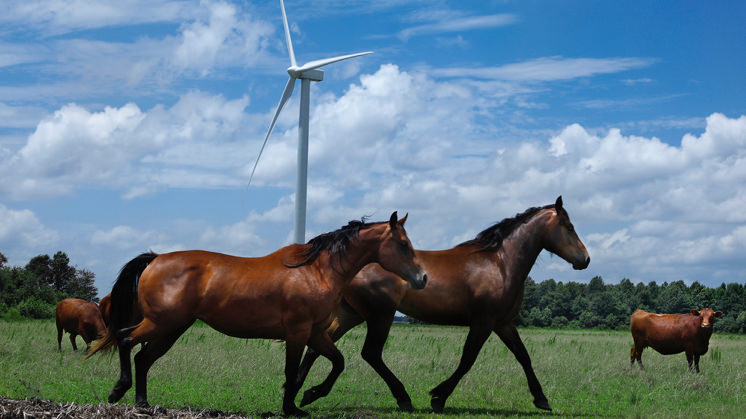Global compact: Interview with Sánchez Galán
The energy transition, a business opportunity
September 2018. Reading time: 3 minutes
On 25 September 2018 the 'El País' newspaper published an interview with the Chairman and CEO of Iberdrola, Ignacio Galán, on his participation in the UN Global Compact 2018 in New York (USA). Galán acknowledged his satisfaction that a Spanish company has been acknowledged for its work in combating global warming.

"The fight against global warming is not simply a moral obligation but also a business opportunity"
For Ignacio Galán, the fight against global warming is not simply a moral obligation but also a "business opportunity". He therefore had no qualms about highlighting Iberdrola's development, acknowledging that "thanks to a strategy that has been aligned with climate action for 20 years and which has involved investment of over $100 billion — at the current exchange rate, over €85 billion — in renewable energies, smart grids and efficient storage, our company is today cleaner, more profitable and more global". Iberdrola's Chairman and CEO also maintained that, thanks to the company's transformation towards renewable energies, it is five times bigger today than when he joined it in 2001.
The price of CO2 as lever of change in Europe
The CO2 Nota market was created to encourage the use of and investment in low emission technologies, whilst reducing the use of higher emission energies. Iberdrola's Chairman and CEO maintained that "the system consists of auctions, performed at European level, in which Member States sell the rights and we operators have to buy the CO2 we expect to use. At one time, the Member States granted rights for free, which has depressed the CO2 market". Ignacio Galán affirmed that the announcement of the withdrawal of 900 million tonnes of CO2 as of January 2019 has created the sense of shortage, which has led to an increase in price in the auctions. As a result, "the Member States are collecting more money: Spain, for example, last year levied €500 million and this year could collect €1.4 billion or €1.5 billion".
The problem is that "these CO2 market funds are not being used to promote renewables at all". For Galán, the case of Spain is simple: "With what is being collected, the tax should be taken off what was levied to pay for the subsidies the previous renewable energies had. And the amount of the bill would go down automatically, which to a certain extent is what the Government is doing now, removing the 7% generation tax. But it has done this across the board, and it should have done it in specific terms, by technology."
Nuclear energy in Spain
Iberdrola's Chairman and CEO considers that "coal is not viable, and its end will come in 2020, 2022 or 2025". Primarily, because "Spain has no coal." This is the fundamental reason, but we shouldn't ignore the economic issue: "if the plants need several billion euros of investment to extend their lifetime for 10 years, the figures will have to be calculated".
"Coal is not viable, and its end will come in 2020, 2022 or 2025"
Galán did not declare himself either anti-nuclear or pro-nuclear: "It's an economic issue. The plants are safe, efficient and costly. Nuclear energy is expensive."
Environmental taxation and the electricity price
Ignacio Galán affirmed that "the principle that the one who contaminates has to pay needs to be applied" and acknowledged that, according to an internal planning study, "between €70 billion and €100 billion will be needed to have 80% renewable electricity production by 2030. With this investment of €70-100 billion up to 2030, the energy price could fall substantially. While now we are at levels of €60 per megawatt, we could be at €40 or €50, which is how the wind and solar auctions are going. If the previous government hadn't slowed down renewable energies and had inverted more, the electricity price would be lower".
"The principle that the one who contaminates has to pay needs to be applied"

Galán also maintained that "you cannot punish those who have done their homework in order to keep those who have not done it competitive. People are talking about a fair transition, and I completely agree."
Profile of the Chairman and CEO
Iberdrola and the energy transition





